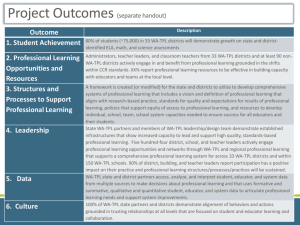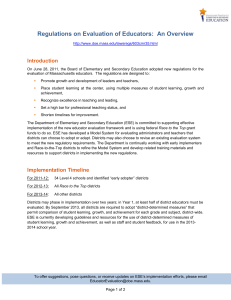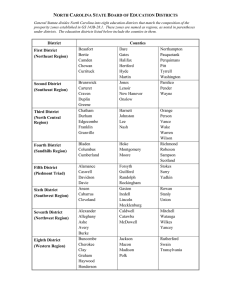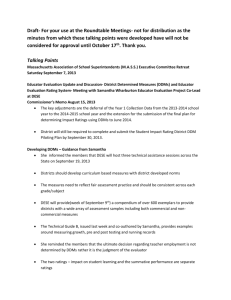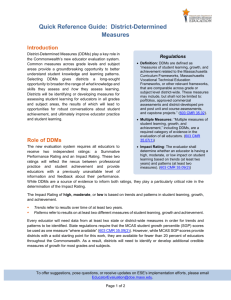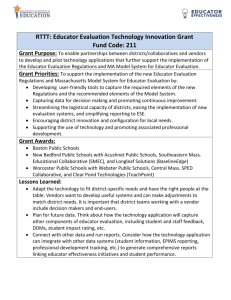2013 08
advertisement
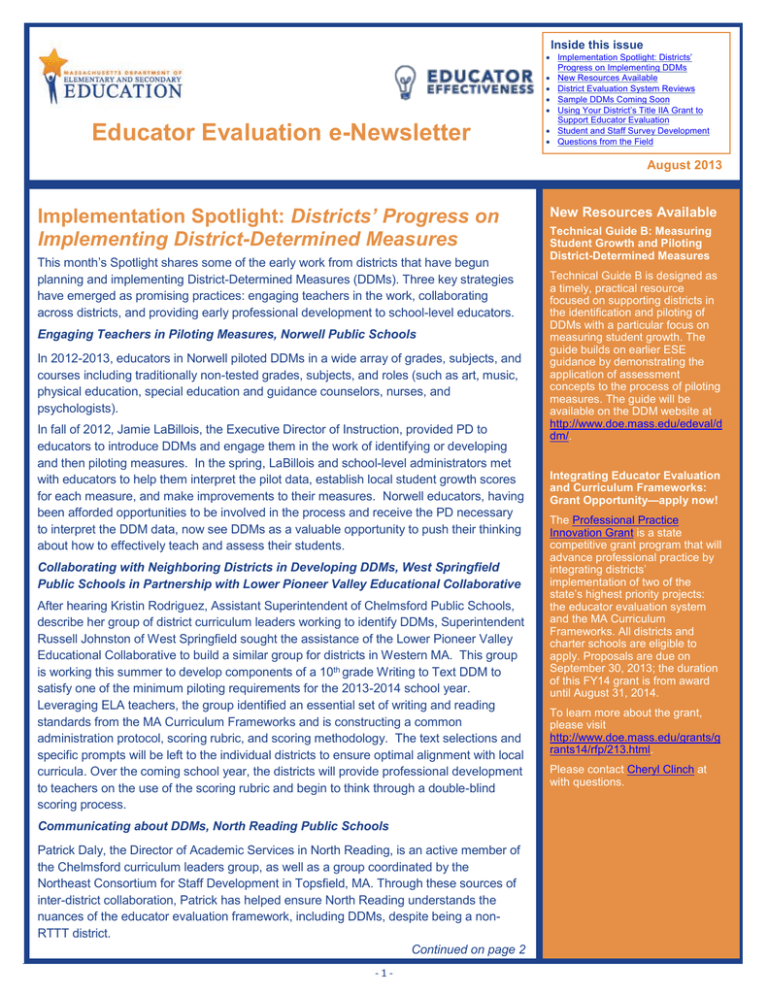
Inside this issue Educator Evaluation e-Newsletter Implementation Spotlight: Districts’ Progress on Implementing DDMs New Resources Available District Evaluation System Reviews Sample DDMs Coming Soon Using Your District’s Title IIA Grant to Support Educator Evaluation Student and Staff Survey Development Questions from the Field August 2013 Implementation Spotlight: Districts’ Progress on Implementing District-Determined Measures This month’s Spotlight shares some of the early work from districts that have begun planning and implementing District-Determined Measures (DDMs). Three key strategies have emerged as promising practices: engaging teachers in the work, collaborating across districts, and providing early professional development to school-level educators. Engaging Teachers in Piloting Measures, Norwell Public Schools In 2012-2013, educators in Norwell piloted DDMs in a wide array of grades, subjects, and courses including traditionally non-tested grades, subjects, and roles (such as art, music, physical education, special education and guidance counselors, nurses, and psychologists). In fall of 2012, Jamie LaBillois, the Executive Director of Instruction, provided PD to educators to introduce DDMs and engage them in the work of identifying or developing and then piloting measures. In the spring, LaBillois and school-level administrators met with educators to help them interpret the pilot data, establish local student growth scores for each measure, and make improvements to their measures. Norwell educators, having been afforded opportunities to be involved in the process and receive the PD necessary to interpret the DDM data, now see DDMs as a valuable opportunity to push their thinking about how to effectively teach and assess their students. Collaborating with Neighboring Districts in Developing DDMs, West Springfield Public Schools in Partnership with Lower Pioneer Valley Educational Collaborative After hearing Kristin Rodriguez, Assistant Superintendent of Chelmsford Public Schools, describe her group of district curriculum leaders working to identify DDMs, Superintendent Russell Johnston of West Springfield sought the assistance of the Lower Pioneer Valley Educational Collaborative to build a similar group for districts in Western MA. This group is working this summer to develop components of a 10th grade Writing to Text DDM to satisfy one of the minimum piloting requirements for the 2013-2014 school year. Leveraging ELA teachers, the group identified an essential set of writing and reading standards from the MA Curriculum Frameworks and is constructing a common administration protocol, scoring rubric, and scoring methodology. The text selections and specific prompts will be left to the individual districts to ensure optimal alignment with local curricula. Over the coming school year, the districts will provide professional development to teachers on the use of the scoring rubric and begin to think through a double-blind scoring process. Communicating about DDMs, North Reading Public Schools Patrick Daly, the Director of Academic Services in North Reading, is an active member of the Chelmsford curriculum leaders group, as well as a group coordinated by the Northeast Consortium for Staff Development in Topsfield, MA. Through these sources of inter-district collaboration, Patrick has helped ensure North Reading understands the nuances of the educator evaluation framework, including DDMs, despite being a nonRTTT district. Continued on page 2 -1- New Resources Available Technical Guide B: Measuring Student Growth and Piloting District-Determined Measures Technical Guide B is designed as a timely, practical resource focused on supporting districts in the identification and piloting of DDMs with a particular focus on measuring student growth. The guide builds on earlier ESE guidance by demonstrating the application of assessment concepts to the process of piloting measures. The guide will be available on the DDM website at http://www.doe.mass.edu/edeval/d dm/. Integrating Educator Evaluation and Curriculum Frameworks: Grant Opportunity—apply now! The Professional Practice Innovation Grant is a state competitive grant program that will advance professional practice by integrating districts’ implementation of two of the state’s highest priority projects: the educator evaluation system and the MA Curriculum Frameworks. All districts and charter schools are eligible to apply. Proposals are due on September 30, 2013; the duration of this FY14 grant is from award until August 31, 2014. To learn more about the grant, please visit http://www.doe.mass.edu/grants/g rants14/rfp/213.html. Please contact Cheryl Clinch at with questions. Implementation Spotlight, continued from page 1 North Reading’s initial focus has been about ensuring the “right” messages about the Student Impact Rating and DDMs are disseminated throughout the district. North Reading has begun providing professional development to administrators and educators regarding assessment and student data through the lens of promoting growth and development. To learn more about this work, check out the materials from our first set of DDM Technical Assistance and Networking Sessions that featured presentations from Norwell Public Schools, the Lower Pioneer Valley Educational Collaborative, and North Reading Public Schools. Sample DDMs Coming Soon! ESE has partnered with WestEd to identify sample DDMs districts can choose to use. This summer, WestEd convened panels of expert educators from districts across the Commonwealth to identify core course objectives for nearly 100 high incidence grades/subjects and courses. ESE extends our thanks to the 231 educators who contributed to the process. Expert panelists included classroom teachers, department chairs, coaches and specialists, district-level curriculum coordinators, and school administrators, among others. Hundreds of educators from across the state also participated in the public review of the panelists’ work, providing both positive and constructive feedback that is being used to finalize the core course objectives. Learn more about the process here: http://www.doe.mass.edu/edeval/ddm/identifycourse.html. WestEd’s assessment experts are presently using the core course objectives to inform the identification of strong assessments that districts can use as DDMs. To date, the team has reviewed over 600 assessments in a wide array of content areas. Sample DDMs, along with the core course objectives to which they are aligned (where applicable), will be made available to districts at the end of the month. ESE appreciates the many districts that provided recommendations for assessments to be included in the set of sample DDMs. Using Your District’s Title IIA Grant to Support Educator Evaluation Implementation The Title IIA grant is a formula grant specifically intended to provide professional development to educators. Therefore, districts can use this grant to support professional development related to the implementation of educator evaluation, including training on the educator evaluation framework, aligning PD opportunities with educator goals and educator plans, and developing and piloting DDMs. Non-Race to the Top (RTTT) Districts As part of the 2013-2014 Title IIA application, districts are required to complete a table by providing brief information on the fiscal resources devoted to educator evaluation training and other implementation costs. This is only applicable to non-RTTT districts, as RTTT districts submitted this information last year. Districts can find the application for the Title IIA grant here. The application deadline is November 1, 2013. If you have any questions about the Title IIA grant, please contact TitleIIAGrants@doe.mass.edu. -2- Reminder: District Evaluation System Submissions Due September 1st All districts (RTTT and non-RTTT) and RTTT charter schools should complete ESE’s online questionnaire by September 1st, 2013. The questionnaire, which includes a document upload tool, collects applicable evaluation documents, such as teacher contract language and rubrics where necessary. RTTT districts will not need to upload materials unless the district made changes to the teacher contract language or the previous agreement had an end date, such as in the case of a one-year MOA. Similarly, RTTT charter schools will not need to upload materials unless changes have been made to the evaluation system. NOTE: districts are not able to complete the survey until local teacher contract language has been ratified by the school committee. The questionnaire should be completed by someone who is aware of materials previously submitted to ESE and who knows details about performance rubrics, including the kinds of modifications made to the MA Model Rubrics if applicable. Contract language that is adapted from the MA Model Contract Language for Teachers must be submitted as a Word document with modifications visibly marked using "Track Changes" or highlighting. The questionnaire can be found here: http://www.surveygizmo.com/s3/1 288394/District-EvaluationSystem-Questionnaire. Meet our new team member! Craig Waterman, Assessment Coordinator As an experienced former teacher and administrator finishing a PhD in Measurement, Evaluation, and Assessment at the University of Connecticut, Craig adds both practical and technical assessment expertise to the team working on DDMs. He currently lives in Malden with his athletic six year old son. Student and Staff Survey Development—How Can You Help? During the 2013-2014 school year, ESE will develop and pilot model student and staff surveys. Click here to share your opinion on what Standards, Indicators and Elements of the model rubrics should be included in ESE’s model surveys. Questions from the Field 1. Can districts pilot DDMs in grades/subjects or courses beyond ESE’s 5 minimum pilot area requirements? 12th Yes! The Commissioner’s April memorandum to the field regarding DDM piloting sets forth five areas in which all districts must pilot at least one DDM during the 20132014 school year. However, districts are encouraged to pilot DDMs in a wide array of grades/subjects and courses, given that DDM implementation will begin during the 2014-2015 school year. Visit our website for more information about piloting DDMs. 2. What information are districts required to submit about DDM piloting by September 30th? 1. By the end of September, all districts must submit a list of the DDMs they intend to pilot during the 2013-2014 school year. This list must include at least one DDM in each of the 5 required pilot areas: (1) early grade literacy; (2) early grade math; (3) middle grade math; (4) high school writing to text; and (5) one traditionally non-tested grade or subject. Districts must complete the District Plan for DDM Piloting template and email it to EducatorEvaluation@doe.mass.edu no later than September 30th. Mark Your Calendar DDMs and Assessment Literacy Webinar 6: Determining How to Integrate Assessments into Educator Evaluation Thursday, October 24th 4:00 p.m. – 5:00 p.m. Register here. NOTE: The webinar series dates have changed. Please visit our website to view the updated dates. Save the Date! DDM Technical Assistance and Networking Session Thursday, Sept. 19th, 2013 2:30 p.m. – 5:30 p.m. Due to the positive feedback received following the sessions held in July, ESE will be hosting a second set of DDM TA & Networking sessions on September 19, 2013. This round of sessions will be focused on DDM pilot planning. The sessions will be held in Holyoke, Chelmsford, and Norwell. Districts are invited to send two team members to attend. Register here. Questions or Comments are always welcome at EducatorEvaluation@doe.mass.edu Contact the Educator Evaluation Team Claire Abbott, Evaluation Training Program, Implementation Support (Currently, on maternity leave until mid-September) Susan Berglund, Evaluation Liaison to Level 3 and Level 4 Districts Kat Johnston, Communications, Peer Assistance & Review, Implementation Support Simone Lynch, Assistant Director, Office of Educator Policy, Preparation and Leadership Ron Noble, Project Co-Lead, Evaluation System Reviews, District-Determined Measures, Staff & Student Feedback Samantha Warburton, Project Co-Lead, MA Model System, Evaluation Training, Implementation Support, Data Reporting Craig Waterman, Assessment Coordinator, District-Determined Measures, Staff & Student Feedback The Department of Elementary and Secondary Education is committed to preparing all students for success in the world that awaits them after high school. Whether you are a student, parent, educator, community leader, taxpayer, or other stakeholder interested in education, we invite you to join us in this endeavor. "To strengthen the Commonwealth's public education system so that every student is prepared to succeed in postsecondary education, compete in the global economy, and understand the rights and responsibilities of American citizens, and in so doing, to close all proficiency gaps." Strengthen curriculum, instruction, and assessment Improve educator effectiveness Turn around the lowest performing districts and schools Use data and technology to support student performance To receive the monthly Educator Evaluation e-Newsletter in your inbox, please subscribe at http://edeval-newsletter-signup.org. -3-
